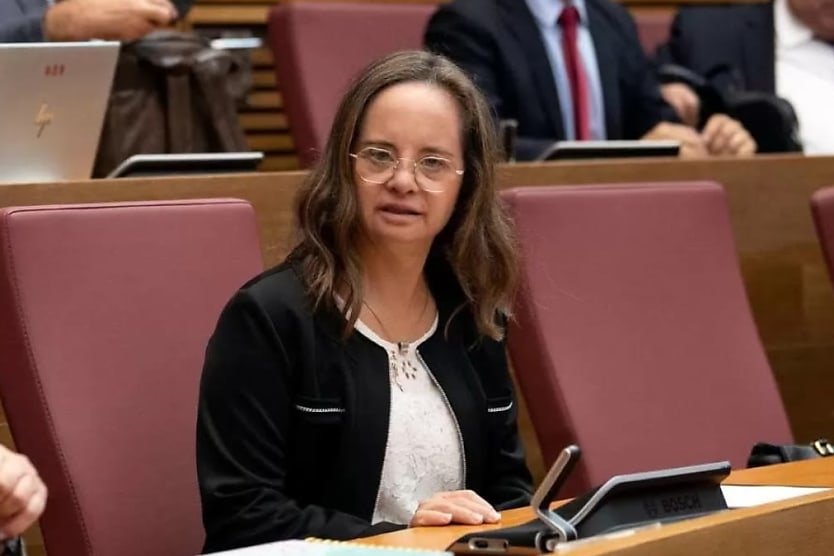
Mar Galcerán has made history as the first politician to be elected in Spain living with Down syndrome. She joins just a couple of others across the world, making great strides for the representation of people with intellectual disabilities.
Breaking the stigma
At just 18 years old, Ms Galcerán joined the conservative People’s Party. Now, at 45 years old, she has gone down as the first parliamentarian in Spain living with Down syndrome.
“It’s unprecedented. Society is starting to see that people with Down’s syndrome have a lot to contribute. But it’s a very long road,” said Ms Galcerán to The Guardian.
There are only a couple of others with Down syndrome who have reached these heights in politics. One is Éléonore Laloux, who is the first and only person to be elected into public office in France.
“I’m a very committed and dynamic person, and I like to be out working with people … I want to fulfil my mandate, be happy, and make other people happy. ... I love what I do,” said Ms Laloux.
“For me, people with disabilities, visible or invisible, are full members of society and have the right to have the same access as everyone else.”
Having this type of representation within politics is important for breaking down stigmas and pushing society to be more inclusive. Jake Majerovic, managing director at thinkless Group, noted that Ms Galcerán’s achievements are inspiring for others with intellectual disability.
“She’s done a fantastic job. It demonstrates that she’s highly competent, and, for me, where that makes it really relevant is to bring awareness to organisations. We can talk about Australia because I know this market needs to be looking at representation at a more meaningful level because there is a definite misconception with Down syndrome in particular,” said Mr Majerovic.
Australia should be looking to break down these barriers for those living with a disability if we’re to make any real progress. Europe is clearly further ahead of the curve, with Down syndrome representation in politics much more common.
Yet another politician making history is Fintan Bray, who, in 2023, became the first person with Down syndrome to be elected to a political position in Ireland.
Mr Bray commented on his achievement: “I’m very proud of the fact that I’ve made history, and I plan on being a voice for everyone with disabilities – especially in terms of important issues such as equity of access to education and paid employment. Now that I have a voice in politics, I want to make a difference and use this role for change and to help others.
“This is a huge personal achievement for me, but also for people with Down syndrome and disabilities all across Ireland. I want to be a role model and represent people living with a disability and ensure they can achieve what they want to achieve and take part in society as much as possible.”
More to be done
Australia should look to emulate the progress made over in Europe if we’re to build a truly inclusive culture. This starts with awareness and education.
“There needs to be a step-by-step approach,” said Mr Majerovic. “Bringing awareness of what it means in practice. Let’s look at what we can do in the Down syndrome space. There’s an obligation now to follow through on actions, not just put an action plan in place and put recognition programs at an HR level.”
“What are you doing as an organisation? Because the misconceptions for me are probably something that we need to look at a broader sense, and I’m certainly willing to get involved where I need to, to break down those barriers because there is a stigma, and that gets in the way of having true equitable employment.”
While the disability royal commission was a great step in turning these attitudes around, Mr Majerovic said Australia must work harder.
“No, Australia is not doing enough. And that’s not just me talking. The royal commission has demonstrated that there are a lot of gaps, and there are a lot of deficiencies that need to be fixed. And this is not an overnight action that needs to be taken. It’s more holistic. It’s more systemic. We need to understand what is the approach that employers need to take with this because, again, there’s a risk of virtue signalling,” he explained.
‘Let’s understand the opportunities’
Approaching disability inclusion as a charity isn’t the way to go about it. Rather than thinking “what can I do for people with disabilities?” think about what they can do for you.
“Let’s understand the opportunities because there’s a fantastic opportunity for us to look at how people with labelled intellectual disabilities can be truly inclusive within employed organisations,” Mr Majerovic said.
As listed by EW Group, the benefits of creating an inclusive workplace are:
- Broader range of perspectives.
- Recruit from a larger pool of talent.
- Understand your customers better.
- Stimulate business innovation.
- Faster, better problem solving.
- Improve overall business performance.
- Enhance your overall reputation.
In the wake of the disability royal commission, employers have the opportunity to reflect and take meaningful action on their diversity, equity, and inclusion.
“The most practical way forward is for employers to take as much responsibility as they possibly can,” concluded Mr Majerovic.
RELATED TERMS
Disability is a persistent condition that limits an employee's capacity to carry out routine tasks. It refers to anything permanent or likely to be permanent, may be chronic or episodic, is attributable to intellectual, mental, or physical impairment, and is likely to require continuous support services.
Jack Campbell
Jack is the editor at HR Leader.










